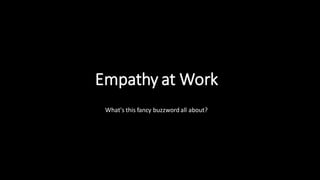
Empathy at work.pdf
- 1. Empathy at Work What's this fancy buzzwordall about?
- 2. menti.com Use the code - 7996 0281
- 3. What is Empathy? Empathyis the ability to perceive and relate to the thoughts, emotions, or experiences of others. Empathyin the context of the workplace simply means that your people can establish true, empathetic connections with one another that enhance relationships and performance.
- 4. Look closer.. One way to recognize why people behave as they do at work is to view an organization as an iceberg. What sinks ships isn’t always what sailors can see, but what they can’t see.
- 5. Why do I need to know this? Story Time 😊 Once upon a time, there was a boy who entered the workplace with a certain orientation to work..
- 7. 4 Temperaments Sanguine people are generally extroverted, sociable, and optimistic. They are energetic and enjoy being around other people. Choleric people are typically more assertive and decisive. They tend to be leaders, and they enjoy taking charge and getting things done. Melancholic people are often introverted and thoughtful. They are analytical and tend to be perfectionists. Phlegmatic people are generally calm and easy-going. They are patient and adaptable, and they tend to go with the flow.
- 8. Choleric: The go-getter, great at accomplishinggoals Strengths: A born leader with energy, enthusiasm, and a strong will; self-confident and optimistic. Weaknesses:May struggle with being empathetic to others’ needs and can tend toward being controlling and overly critical of others. Melancholic: The deep thinker with strong ideals and passionatefeelings Strengths: Naturally skilled atkeeping things organized and humming along smoothly; a faithfulfriend who connects deeply with people. Weaknesses: May struggle with perfectionism or negativity(of self and others); and can be easily overwhelmed by life. Sanguine: The “people person” and life of the party Strengths: adventurous,creative, and just plainlikable;thrives on social interactionsand sharing life with others. Weaknesses: May struggle with follow-through and gets easily over-committed;can lack self-control or tend to avoidthe tougher parts of life and relationships. Phlegmatic: The servant leader who is calm under pressure Strengths: supportive,empathetic, and a great listener; often the peacemaker looking out for others; easily contentedand happy to be part of the team (not the boss). Weaknesses: may struggle to take initiativewhen necessary and can avoidconflict and sharing strong feelings.
- 10. How is this Important? The more self-awareness we have, the better! Understanding our unique personalities helps us thrive in the workplace, and in life. It helps us understand why certain situations feel extra hard when others seem to breeze through them. The four temperaments theory gives us one helpful “clue” among many others for understanding ourselves and others better.
- 11. How is this Important? Examples Someone with a dominant phlegmatic temperament will find it quite hard to work with someone with a choleric dominant temperament. Melancholic dominant temperaments are often too hard to please at work since they demand perfection and are highly analytical. Melancholic dominant temperaments don’t usually enjoy the company of high-octane energy exhibiting Sanguines, their opposites in many ways.
- 14. Takeaway ☺ Empathytakes effort. It takes understanding yourself and others around you. It takes mindfulness, compassion, and kindness. Empathycan feel uncomfortable sometimes. And that’s okay! It’s a journey for all of us. Leverage temperaments, orientations to work, and other traits to help you empathize better at work.
- 15. Thank You!